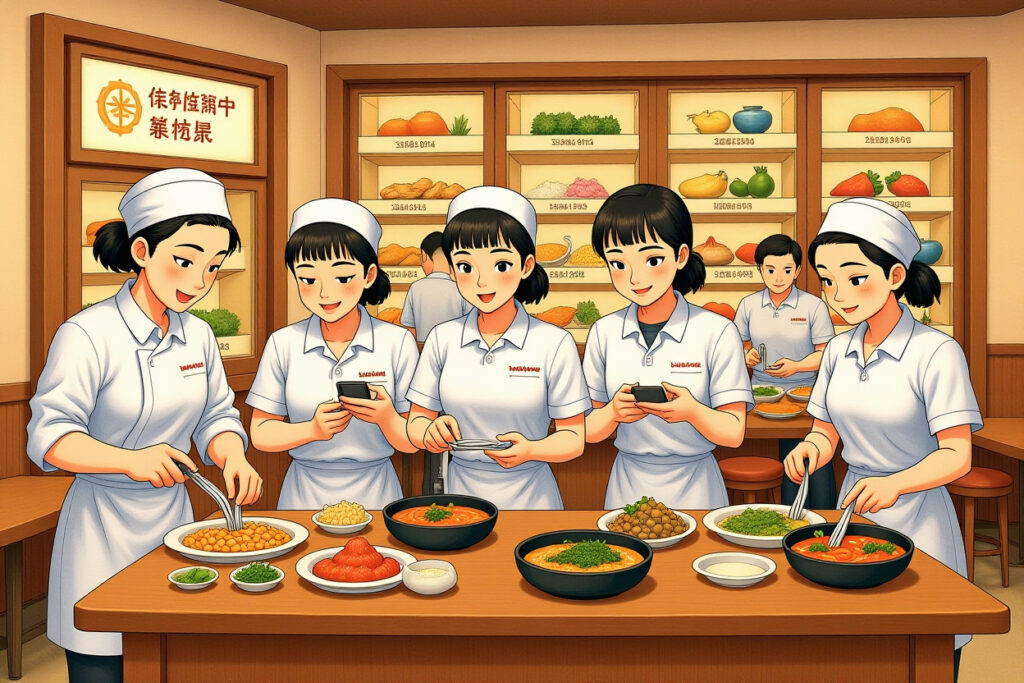Restaurant Empire Under Fire
China’s culinary landscape is facing one of its most significant credibility crises as Xi Bei莜面村 (Xi Bei Youmian Village), the beloved northwestern Chinese restaurant chain, finds itself at the center of a heated public debate about pre-made dishes and consumer transparency. What began as a social media exchange between founder Jia Guolong (贾国龙) and technology entrepreneur Luo Yonghao (罗永浩) has escalated into a full-blown business crisis that threatens the very foundation of one of China’s most prominent restaurant chains.
The controversy highlights the growing tension between operational efficiency and consumer expectations in China’s rapidly evolving food service industry. As restaurants increasingly rely on centralized kitchen operations and pre-prepared components to maintain consistency across locations, customers are becoming more vocal about their right to know exactly what they’re eating and how it’s prepared.
This clash between operational necessity and consumer demand for authenticity represents a critical juncture for the entire Chinese restaurant industry. The outcome of Xi Bei’s current crisis could establish new standards for transparency and redefine what constitutes acceptable kitchen practices in the eyes of Chinese consumers.
The Pre-Made Dishes Controversy Erupts
The current firestorm began when Luo Yonghao shared his dining experience at Xi Bei on Weibo, China’s popular microblogging platform. His comments about pre-made dishes struck a nerve with thousands of Chinese consumers who have grown increasingly skeptical about food preparation practices in chain restaurants.
Consumer Experiences Surface
Numerous consumers came forward with concerning anecdotes about their experiences at Xi Bei locations across China. One customer reported finding plastic packaging remnants in their dish, with staff acknowledging that the item had been pre-prepared. Another witnessed kitchen staff assembling children’s meals from pre-packaged components, attempting to conceal the process when noticed.
These accounts gained traction on social media platforms, with many consumers expressing frustration about what they perceive as deceptive practices. The controversy intensified when “Qianjiang Video”直播 (Qianjiang Video Live Broadcast) discovered two types of genetically modified oils at a Xi Bei location in Hangzhou, adding another layer to the growing concerns about transparency.
Price Versus Value Debate
Beyond the pre-made dishes controversy, consumers raised questions about Xi Bei’s pricing strategy. Despite Jia Guolong’s assertion that their pricing is reasonable—citing average profit margins below 5% in the first half of the year—many customers expressed dissatisfaction with what they perceive as high prices for questionable quality.
The core issue centers on value proposition: if consumers are paying premium prices at sit-down restaurants, they expect freshly prepared meals rather than reheated pre-made dishes. This expectation gap has created significant challenges for Xi Bei and other chain restaurants operating in China’s competitive culinary market.
Xi Bei’s Ambitious Pre-Made Dishes Strategy
Consumer suspicions about Xi Bei’s use of pre-made dishes didn’t emerge from nowhere. The company had previously invested significantly in developing this very business segment, making the current denial of such practices particularly problematic from a credibility standpoint.
Jia Guolong Kung Fu Food Initiative
In September 2019, Xi Bei launched its first pre-made dish product—lamb spine hot pot—under the Jia Guolong Kung Fu Food (贾国龙功夫菜) brand. When the COVID-19 pandemic dramatically increased demand for home dining options, Xi Bei pivoted aggressively toward pre-made dishes, viewing them as the future of the food industry.
Jia Guolong personally endorsed the initiative, putting his reputation behind the brand. “Kung Fu Food has my name on it, and the logo uses my portrait,” he stated at the time. “Basically, I’m guaranteeing it with my personal reputation.” The company positioned pre-made dishes as its core growth strategy, investing substantially in infrastructure to support this vision.
Substantial Infrastructure Investment
In May 2020, Xi Bei announced plans to invest 1 billion yuan in building a central kitchen in Tianjin to serve the Beijing-Tianjin-Hebei region. This facility was intended to support the expanded pre-made dishes operation, ensuring consistent quality and efficient distribution to both restaurants and direct consumers.
By October 2020, the first Jia Guolong Kung Fu Food restaurant opened in Beijing’s Jin Yuan Shopping Center, featuring over 30 SKUs from northwestern Chinese cuisine and eight major Chinese culinary traditions. The innovative concept eliminated traditional kitchens entirely, relying instead on heating stations to prepare pre-made dishes for dine-in customers.
The expansion continued in March 2021, with Kung Fu Food sections appearing in all 300+ Xi Bei locations nationwide. Consumers could select pre-made dishes for immediate heating and consumption or purchase them for home preparation. The company also established online sales channels through flagship stores on major e-commerce platforms.
Market Reality Versus Ambition
Despite substantial investment and strategic positioning, consumer response to Xi Bei’s pre-made dishes initiative fell dramatically short of expectations. The market rejection forced a strategic retreat that now complicates the company’s current positioning.
Poor Market Reception
Sales data tells a clear story of market rejection. On Tmall, Xi Bei’s Kung Fu Food flagship store shows modest sales at best, with the top-selling item—organic oat noodles—recording only around 100 orders, while beef patties managed merely 4 orders. This tepid response indicated that consumers weren’t embracing pre-made dishes as enthusiastically as Xi Bei had anticipated.
Jia Guolong acknowledged the failure in an interview with Daily Economic News, stating that consumer resistance led to the gradual phasing out of Kung Fu Food products. “This is the result of consumers voting with their feet,” he explained. “As restaurant operators, when consumers don’t like or accept something, we can only follow market demand and gradually remove Kung Fu Food.”
The 100% No Pre-Made Dishes Claim
In response to the current controversy, Jia Guolong has emphatically stated that all Xi Bei locations now operate with “100% no pre-made dishes.” This position finds some support in regulatory definitions established in 2024 by China’s State Administration for Market Regulation and five other government departments.
The official definition specifies that pre-made dishes involve industrial pre-processing and exclude主食 (staple foods), 即食食品 (ready-to-eat foods), and凉拌菜 (cold dishes). Most significantly, dishes delivered from central kitchens to restaurants don’t qualify as pre-made dishes under this regulatory framework.
However, this technical definition conflicts dramatically with consumer understanding. Most diners consider any food not prepared on-site as falling into the pre-made category, creating a significant perception gap that undermines Xi Bei’s claims.
Broader Implications for China’s Restaurant Industry
The Xi Bei controversy extends far beyond one company’s operational challenges, highlighting systemic issues facing China’s entire restaurant sector as it balances efficiency with consumer expectations.
Trust and Transparency Crisis
China’s restaurant industry faces a growing trust deficit as consumers become more sophisticated and concerned about food quality and preparation methods. The pre-made dishes debate represents a fundamental clash between operational efficiency and consumer demand for authenticity and transparency.
Zhu Danpeng (朱丹蓬), China Food Industry Analyst, offered perspective to Phoenix Net Finance’s Company Research Institute: “From a certain angle, Xi Bei’s approach can also be called pre-making. For example, if they prepare 20 portions in the morning but only sell 10 at lunch, the remaining 10 sold in the afternoon or evening—isn’t that pre-made dishes?” This commentary highlights the definitional challenges at the heart of the controversy.
Industry-Wide Challenge
Xi Bei’s struggle reflects broader industry tensions as restaurants seek to scale while maintaining quality and authenticity. The economic pressures of operating multiple locations inevitably push chains toward centralized preparation and standardized processes, yet consumers increasingly value the perception of freshness and individual preparation.
This tension is particularly acute in China, where culinary traditions emphasize fresh ingredients and skilled preparation. As chain restaurants proliferate, they must navigate these cultural expectations while achieving the economies of scale necessary for profitability.
Path Forward for Xi Bei and the Industry
The current crisis presents both challenges and opportunities for Xi Bei and similar restaurant chains operating in China’s competitive market. How companies respond to increasing consumer demand for transparency will likely determine their long-term viability.
Strategic Options for Recovery
Xi Bei faces several potential paths to rebuild consumer trust. These could include greater transparency about food preparation methods, clearer communication about ingredient sourcing, or even reimagining their kitchen operations to accommodate more on-site preparation without sacrificing consistency across locations.
Some industry observers suggest that hybrid models—combining certain pre-prepared components with finished dishes prepared on-site—might offer a compromise that balances operational efficiency with consumer expectations for freshness and authenticity.
Regulatory and Standardization Needs
The controversy highlights the need for clearer industry standards and regulations around food preparation terminology and disclosure requirements. As pre-made dishes become increasingly common in restaurant operations, establishing transparent labeling and disclosure standards could help align consumer expectations with operational realities.
Industry associations and regulatory bodies may need to develop more nuanced categorization that distinguishes between different levels of food preparation—from completely pre-made dishes to those incorporating some pre-prepared components alongside fresh ingredients prepared on-site.
Navigating the New Restaurant Reality
The Xi Bei controversy represents a critical moment for China’s restaurant industry, highlighting the growing disconnect between operational practices and consumer expectations. As pre-made dishes become increasingly necessary for chain restaurants seeking scale and consistency, transparency and communication become essential components of customer trust.
For Xi Bei specifically, the path forward requires balancing honest communication about food preparation with maintaining the quality standards that built their reputation. The company’s future may depend on its ability to bridge the gap between operational reality and consumer perception, perhaps by reimagining how pre-prepared components are integrated into their menu offerings.
The broader restaurant industry should view this controversy as a warning about the importance of transparency in an era of increasingly skeptical consumers. Those establishments that embrace open communication about their kitchen practices—even when incorporating pre-made elements—may find stronger customer loyalty than those who attempt to conceal standard operational procedures.
For investors and industry professionals monitoring this situation, the key takeaway is that consumer expectations around food transparency are evolving rapidly in China. Companies that proactively address these concerns rather than reacting to controversies will likely enjoy competitive advantages in the increasingly challenging restaurant market.




